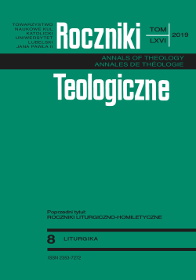Liturgische Texte zu ehren der heiligen drei Könige
Abstrakt
Teksty liturgiczne ku czci Świętych Trzech Króli
W niniejszym artykule chodziło o ukazanie czytelnikowi bardzo małego fragmentu z o wiele szerszego zagadnienia: Liturgia dla podróżujących, pielgrzymów i pływających po morzu. Na podstawie badań okazało się, że Kościół, jak wynika z pierwszych spisanych źródeł liturgicznych, tzn. sakramentarzy, a potem zwłaszcza, u szczytu średniowiecza, z pontyfikałów, mszałów i rytuałów troszczył się o tych ludzi poprzez przygotowanie odpowiednich tekstów liturgicznych. Należy wymienić tutaj formularze mszalne: Pro iter agentibus, Pro peregrinantibus i Pro navigantibus. To pierwsza grupa. Drugą grupę stanowią obrzędy błogosławieństwa osób udających się w podróż lub na pielgrzymkę (Ordo ad servicium peregrinorum faciendum) bądź ich utensyliów podróżnych, takich jak torba, laska, krzyż i płaszcz (Benedictio ad baculum et ad peram) oraz obrzędy po powrocie z pielgrzymki czy podróży (Benedictio peregrinorum post reditum). Z tego bogactwa modlitw niewiele formuł w liturgii posoborowej pozostało w użyciu.
Osobny i bardzo interesujący rozdział stanowią teksty liturgiczne, które są związane z patronatem niektórych świętych, takich jak św. Jakub Starszy, św. Rafał Archanioł, św. Julian i św. Krzysztof oraz Święci Trzej Królowie. W przypadku Świętych Trzech Króli, którzy uważani byli w średniowieczu za patronów podróżujących i pielgrzymów i których relikwie w katedrze kolońskiej ściągały zarówno nowo koronowanych królów, jak i rzesze innych pielgrzymów z całej Europy, chodzi o pierwszych pielgrzymów epoki chrześcijańskiej, którzy odbyli pielgrzymkę do nowo narodzonego Jezusa Chrystusa. Zastanawiające jest to, że formularze mszalne (bo obrzędy błogosławieństwa nie są znane), można sklasyfikować w cztery grupy. W całej Europie – od Anglii po Niemcy i Polskę – można je znaleźć w wielu mszałach średniowiecznych, ale nie w mszałach kolońskich.
W niniejszym artykule przedstawiono tylko pierwszy formularz mszalny De tribus magis pro iter agentibus. Oracje mszalne rozwijają motyw drogi magów ze Wschodu do Betlejem, aby pokłonić się Mesjaszowi, którego szczególna gwiazda wzeszła na niebie i ich do Niego zaprowadziła, aby mogli Go uczcić mistycznymi darami. Kościół modli się za swoich wiernych zdążających w pielgrzymce, aby za przyczyną tych świętych i przez ich zasługi przebiegała ona w pokoju, zdrowiu i pomyślności. Sam Chrystus, nazwany prawdziwym Słońcem, Gwiazdą i Światłością, niech ich prowadzi bez szwanku do upragnionego sanktuarium. Dalej Kościół prosi Boga, aby dał pielgrzymom Anioła pokoju jako towarzysza drogi, strzegącego ich przed niebezpieczeństwami ciała i duszy oraz przed atakami starego wroga, tzn. szatana, a także by stali się godni towarzystwa Ducha Świętego. Kolejna myśl poruszona w euchologii to dzieje Syna Bożego (wcielenie, męka i zmartwychwstanie) oraz rola aniołów jako Jego świadków, która ma się przedłużyć w opiece dniem i nocą nad pielgrzymami. W pierwszym czytaniu biblijnym (Rdz 24, 7) chodzi o podróż Abrahama do jego ojczyzny i obietnicę anioła jako towarzysza drogi. Natomiast perykopa ewangelijna (Łk 4, 23b-30) to rozmowa faryzeuszów z Jezusem, który w swojej ojczyźnie nie jest przyjmowany z otwartymi rękami. W czasie tej rozmowy ważną rolę odgrywa napięcie między obczyzną i ojczyzną oraz obcym i swoim. Z tego względu pewnie nastąpił wybór tej perykopy do formularza mszalnego. Antyfony mszalne (introitus, graduale, offertorium i communio) mają jako źródło fragmenty psalmów i podejmują typowe dla omawianego tematu motywy: prowadzenie przez Boga w drodze, towarzystwo aniołów w drodze, zaufanie Bogu oraz ratunek w Bogu. Sekwencja Maiestati sacrosantae militans, która była czasami dołączana do tego formularza, będzie omówiona w osobnym artykule.
Bibliografia
Die Heiligen Drei Könige – Darstellung und Verehrung. Katalog zur Ausstellung des Wallraf-Richartz-Museums in der Josef-Haubrich-Kunsthalle Köln (1. Dez. 1982 bis 30. Jan. 1983), Köln 1982, 16-19.
Flinspach, Karl-Heinz, und Annette Heusch-Altenstein. Jakobswege. Wege der Jakobspilger im Rheinland, Bd. 1. Köln: J.P. Bachem Verlag, 2001.
Franz, Adolph. Die Messe im deutschen Mittelalter. Freiburg: Herder, 1902.
Schauber, Vera, und Hanns Michael Schindler (Hgg.). Bildlexikon der Heiligen, Seligen und Namenspatrone. Augsburg: Pattloch, 1999.
Torsy, Jakob. Achthundert Jahre Verehrung der Heiligen Drei Könige in Köln 1164-1964 (= Kölner Domblatt 23/24). Köln: J.P. Bachem Verlag, 1964.
Copyright (c) 2019 Roczniki Teologiczne

Utwór dostępny jest na licencji Creative Commons Uznanie autorstwa – Użycie niekomercyjne – Bez utworów zależnych 4.0 Międzynarodowe.





